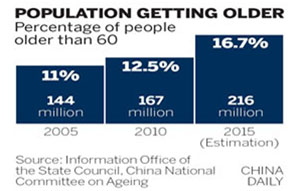Inforgraphic
Nursing homes close doors to many
Updated: 2011-03-02 15:35
By He Dan (China Daily)
|
 |
|
Zhong Xili (left), 68, and 61-year-old Lu Yuechun enjoy their wedding on Monday at a nursing home in Yanggu county, Shandong province. The couple got to know each other at the facility. [Photo / China Daily] |
About 33 million seniors have completely or partially lost the ability to live independently, which accounts for about 19 percent of the country's over-60s, according to research jointly conducted last year by the China National Committee on Ageing and the China Research Center on Ageing.
But, despite the fact that there is so much demand for assisted living spaces, the report said there was a lack of facilities offering the services.
"At the moment, most old people in China still rely on family members to care for them," said Zhang Kaiti, director of the China Research Center on Ageing. "Support from the government, communities and non-government organizations is very limited."
 |
The report said people's ability to live independently is measured by how well they cope with six everyday activities that include feeding themselves, dressing, using the bathroom and bathing.
The report said those who are unable to look after themselves will be forced to either rely on family or other helpers or find a space in an assisted living facility.
By the end of 2015, the number of seniors who are not able to look after themselves is expected to hit 40 million. At that time 16.7 percent of the country's population - some 216 million people - will be older than 60.
Zhang said the family planning policy, which has limited most urban families to one child, alongside the tendency of people to work away from their hometowns are making it harder for families to care for their older relatives.
The report said about 40 million seniors in rural areas are not being cared for by their offspring.
In some big and medium-sized cities, empty-nest homes comprise 70 percent of households.
"Both my wife and I are thinking about moving into a nursing home because we don't want to be a burden for our son who is now working in the United States," said a retiree in Huai'an city in Jiangsu province surnamed Wang.
| ||||
Although the country's nursing institutions are taking care of 2 million old people, the service most of them offer is unable to satisfy the rapidly ageing society, and especially inadequate for people with physical or mental health needs.
The report revealed that fewer than 60 percent of nursing homes in China are equipped with infirmaries. Fewer than half have access to doctors. And less than 30 percent provide trained nurses.
Wang Changliang, an 86-year-old Shanghai resident, described a home he stayed in as being like a prison.
Despite the fact that he needs 24-hour care because of diabetes and urinary incontinence, Wang left the nursing home and went back into the community.
"I could not go outside freely or eat whatever I liked when I lived at the nursing home," said Wang, who is now being looked after by a paid helper and one of his children.
E-paper

Lingua franca
Chinese are learning English on a scale never seen before and the business of teaching is booming.
Golden run ahead
Looking abroad
Mapping out a plan
Specials

NPC & CPPCC sessions
Lawmakers and political advisers gather in Beijing to discuss major issues.

Sentimental journey
Prince William and Kate Middleton returned to the place where they met and fell in love.

Rent your own island
Zhejiang Province charts plans to lease coastal islands for private investments




